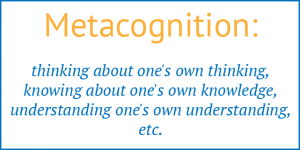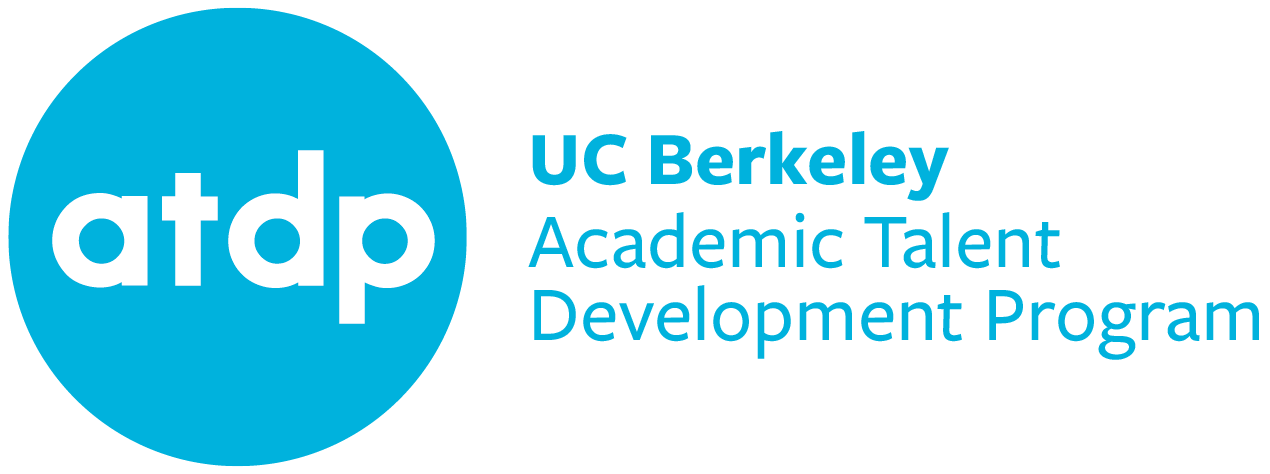 Research has shown that successful math students use sophisticated thinking skills when they solve challenging math problems. These thinking skills, known as metacognition, include choosing how to solve problems based on their mathematical strengths and weaknesses, planning and monitoring the steps they use to solve a problem, and being aware of what they know and what they don’t understand as they solve problems. In my doctoral dissertation, I examined the types of metacognition that ATDP students enrolled in Secondary Division mathematics courses used as they solved non-traditional math problems and how ATDP students’ metacognition was related to other measures of students’ academic achievement.
Research has shown that successful math students use sophisticated thinking skills when they solve challenging math problems. These thinking skills, known as metacognition, include choosing how to solve problems based on their mathematical strengths and weaknesses, planning and monitoring the steps they use to solve a problem, and being aware of what they know and what they don’t understand as they solve problems. In my doctoral dissertation, I examined the types of metacognition that ATDP students enrolled in Secondary Division mathematics courses used as they solved non-traditional math problems and how ATDP students’ metacognition was related to other measures of students’ academic achievement.
What Types of Metacognition Do ATDP Students Use?
Some ATDP students used well-developed metacognitive skills as they solved math problems. These students:
- focused on mathematically understanding the problem and what the problem was asking them to do, then developed a plan to solve the problem based on this mathematical understanding.
- actively monitored their progress as they solved math problems and corrected their mistakes and misunderstandings when they occurred.
- verified their final solutions to make sure they were reasonable and made sense in relation to the original problem.
Some ATDP students lacked metacognitive skills as they solved math problems. These students:
- selected strategies to solve math problems without first understanding what the problems were asking.
- failed to identify or make the appropriate corrections when they made mistakes as they solved math problems.
- were in some cases unable to think of a way to solve a math problem and subsequently gave up or said there was “no solution” to the problem.
How are ATDP Students’ Metacognitive Skills Related to Academic Achievement?
ATDP students’ use of metacognitive skills was related to their success in their ATDP mathematics course grades and on the ATDP mathematics placement test.
- ATDP students with high metacognitive skills received meaningfully higher grades in their ATDP mathematics courses than ATDP students with low metacognitive skills.
- ATDP students with high metacognitive skills scored meaningfully higher on the ATDP mathematics placement test than ATDP students with low metacognitive skills.
ATDP students’ use of metacognitive skills was not related to their prior school achievement.
- ATDP students’ school grade point averages (GPAs) did not significantly differ between students with high and low metacognitive skills.
- ATDP students’ school mathematics grades did not significantly differ between students with high and low metacognitive skills.
Findings from my doctoral dissertation suggest that metacognition plays an important role in students’ success in ATDP mathematics courses. In contrast, metacognition is not essential for ATDP students to succeed in their mathematics classes and overall during the regular school year. This may be related to the accelerated pace or academically curious peer group in which ATDP students are expected to function, although causal distinction cannot truly be determined without further study. At ATDP, we encourage all students to develop and use metacognition in their approach to academic problems.
What does this look like in the classroom? See examples of SD instructors getting your students to think about their thinking.
For more on Metacognition:
Bransford, J. D., Brown, A. L., & Cocking, R. R. (Eds.). (2000). How people learn: Brain, mind, experience, and school (Expanded ed.). Washington, DC: National Academy Press.
De Corte, E., Greer, B., & Verschaffel, L. (1996). Mathematics teaching and learning. In D. C. Berliner & R. C. Calfee (Eds.), Handbook of educational psychology (pp. 491-549). New York: Macmillan Library Reference USA.
Young, A. E. (2010). Explorations of metacognition among academically talented middle and high school mathematics students (Doctoral dissertation). Available from Proquest UMI Dissertation Publishing database. (Proquest No. 2128952731)
More on ATDP Student and Parent Learning…
- It All Starts With Play: Anticipatory Socialization in the Elementary Classroom
by Nina Hersch Gabelko, Program Director - Rekindling the Joy of Learning in Secondary Education
by Beverly J. Vandiver, Head Counselor - Parents Come to Learn
by Nina Hersch Gabelko, Program Director
